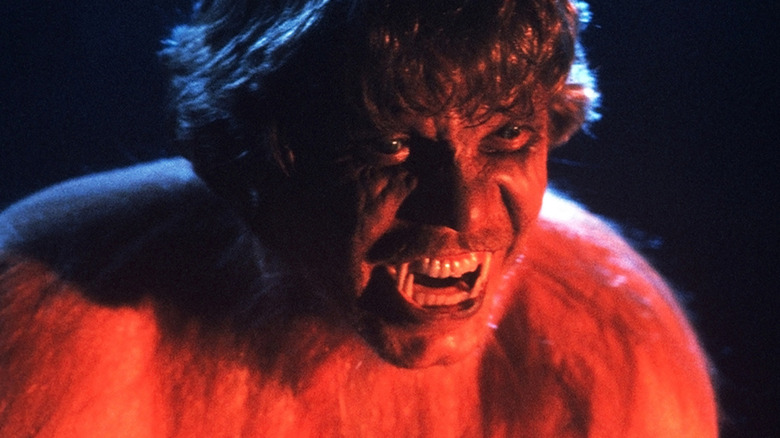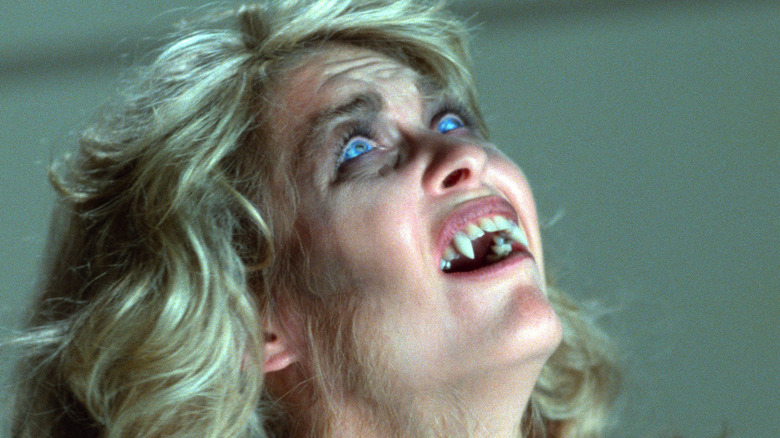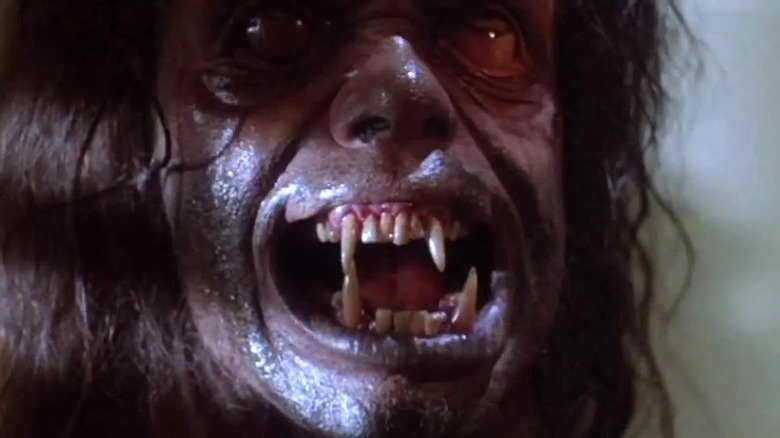Joe Dante Didn't Want To Sell The Howling As A 'Werewolf Movie'
Easily my favorite movie reference in "Scream" is the line, "What's that werewolf movie with E.T.'s mom in it?" That would be Joe Dante's gloriously seedy "The Howling," one of three lycanthrope flicks that hit theaters in 1981. Unabashedly sticking to its B-movie roots, the film outperformed Albert Finney vs. Real Wolves in "Wolfen," but got left a little in the dust by "An American Werewolf in London." Perhaps that was no surprise because John Landis was on a hot streak after "Animal House" and "The Blues Brothers," and his first foray into horror was slicker, more expensive, and, despite its fair share of shocks, generally more respectable than Dante's low-budget shocker.
More's the pity. Despite the cult appeal of his earlier movies, Landis was more of a commercial crowdpleaser in the '80s and I always got the sense that he was a little ashamed of the horror status of "An American Werewolf in London," reflected in its somewhat flippant tone. Dante, meanwhile, made his directorial debut with the killer fish movie "Piranha" and never strayed far from his Roger Corman-schooled origins. If it's your bag, it is worth spending an evening trawling through his "Trailers from Hell," where he appraises old monster movies with the same kind of reverence that Martin Scorsese has when talking about "The Bicycle Thieves" or the masterpieces of Powell and Pressburger.
Prior to that 1981 treble-whammy, werewolf movies had been out of fashion for a few decades, which meant even Landis' backers were wary of his irreverent approach. Dante, on the other hand, was very conscious that werewolves were far from vogue, so decided to cut his trailer to resemble something a bit more fashionable in the wake of "Halloween" and "Friday the 13th."
So what happens in The Howling again?
Befitting her later role as "E.T.'s mom," Dee Wallace is very sympathetic as Karen White, a news anchor who bravely acts as bait in a police sting to catch a serial killer who has been stalking her. Meeting the murderer Eddie Quist (Robert Picardo) in a porno theater, a pair of cops gun down the maniac just as he's about to attack her. She blanks out all memory of the encounter, and the trauma prevents her from returning to work.
Her therapist Dr. Waggner (Patrick MacNee) recommends taking time out with her husband Bill (Christopher Stone) to a resort known as "The Colony" to recuperate. It quickly transpires that the joint is an enclave for werewolves, and one of their most prominent members, Marsha (Elisabeth Brooks) wastes no time trying to seduce Bill. Meanwhile, Eddie's corpse goes A.W.O.L. from the morgue and two of Karen's colleagues try to get to the bottom of the mysterious goings-on.
Unlike regular movie werewolves, these guys can transform at will, and the last third of the film is a cavalcade of impressively hairy and gloopy monster mayhem as Eddie and the other lycanthropes go on the attack.
"The Howling" is dated but still effective, largely thanks to its humor. Dante was ahead of the curve in appreciating that horror fans knew the tropes, and the movie is peppered with in-jokes and references. The cast is also a treasure trove for cult aficionados, including a fun turn from Dante-regular Dick Miller as an occult bookshop owner. Today, it's probably best remembered for the special effects by Rob Bottin, who would turn stomachs the following year in "The Thing." They aren't as technically accomplished as Rick Baker's full-glare transformation in "An American Werewolf in London," but are far more nightmarish.
The trailer pitched The Howling as a different subgenre
Dante was very conscious of the old-hat reputation of werewolf movies when it came to marketing "The Howling," telling AV Club:
"Initially the studio wanted to sell it with a poster of a naked woman who was half-wolf and half-person... So we had to disabuse them of the notion that we had made a cheap piece of s***, and try to get them to do something that was a little bit more interesting. And also, we didn't want to sell it as a werewolf movie because that was considered generally old-fashioned – and so we sold it as a slasher movie. That's why the trailer is the way it is. It makes it look like there's this menace stalking the city and all that."
Dante's objection to the poster was well-founded and resulted in one of the coolest images from the '80s golden age of horror poster art — a female werewolf on the turn clawing her way through a blank canvas. As for the trailer, you don't need to be especially eagle-eyed to deduce that werewolves are involved, but I get the director's point. It also has a grubby atmosphere of urban menace that could be mistaken for William Friedkin's "Cruising."
The approach may have contributed to the film's decent box office and the strength of the movie got Dante the "Gremlins" gig. 1981, that year of the werewolf, revived interest in shapeshifters and ushered in a new wave of lycanthrope movies from "Teen Wolf" to "The Company of Wolves." Landis even directed Michael Jackson as a werewolf in the famous "Thriller" music video. Over the years, "An American Werewolf in London" has achieved high status as one of the best werewolf movies ever, but the rougher, scarier "The Howling" is an underrated fright-fest from a B-movie maestro, and a must-see.


